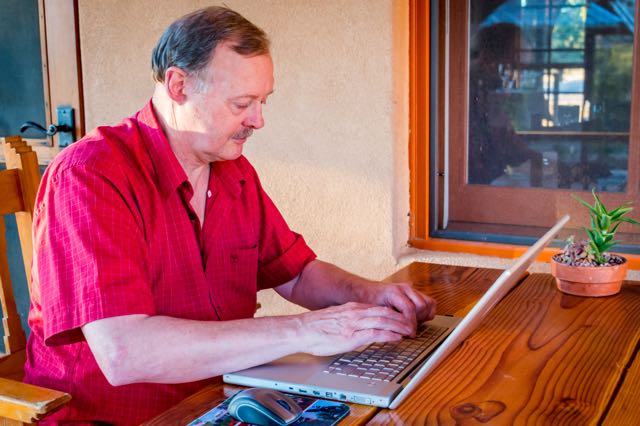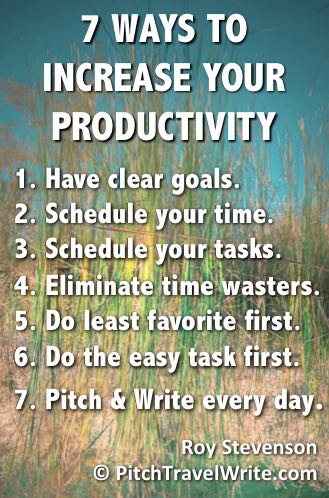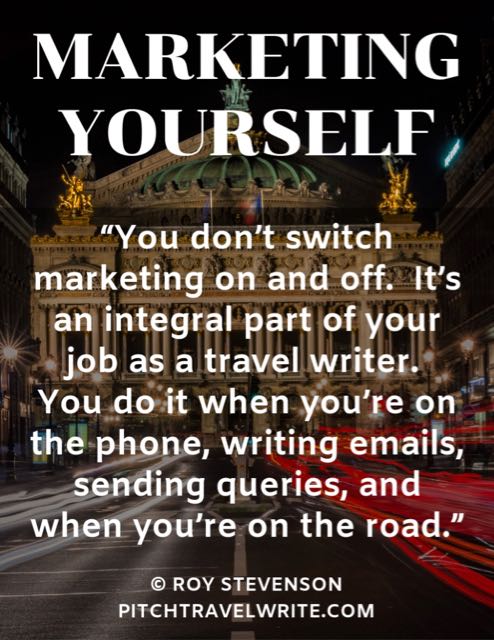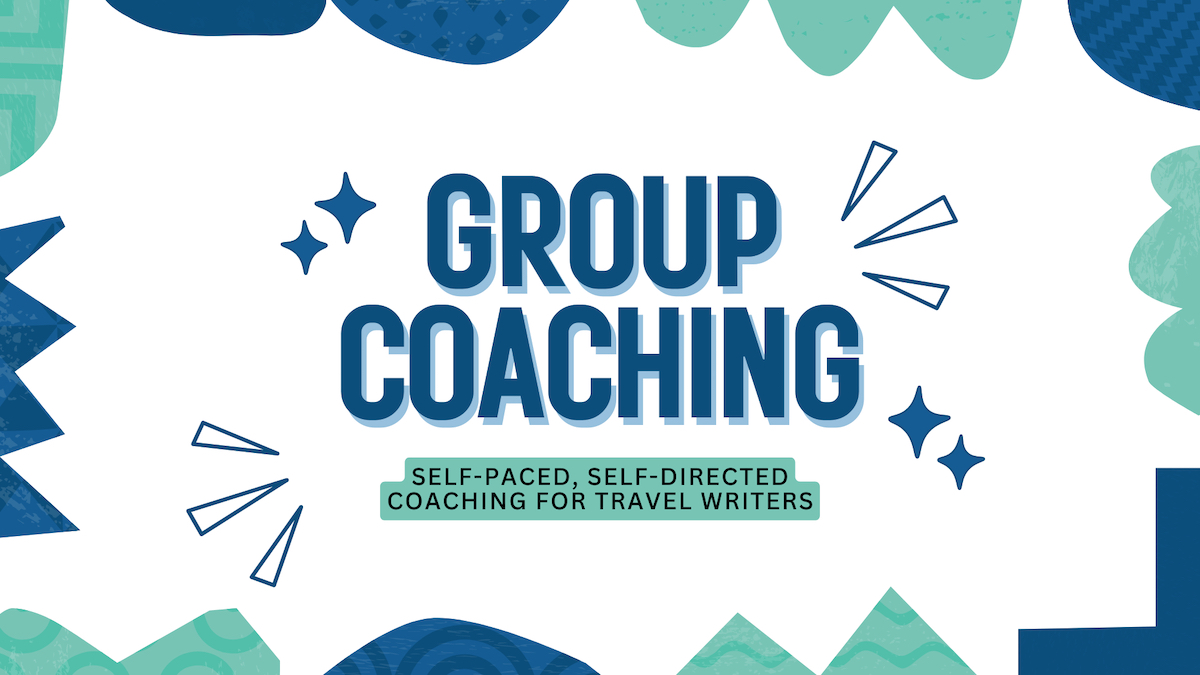- Home
- Business Basics for Travel Writers
- Increase Productivity with these 7 tips
Seven Ways to
Increase Productivity and
Take Control of Your Time
By Roy Stevenson
The idea to increase productivity was not on your mind, I'm sure, when you decided to become a freelance travel writer. More likely, your main thoughts were about the freedom you'd have to write - and it probably didn't go much deeper than that.
As a freelance writer, you can wake up without an alarm clock, take time off to exercise, meet a friend for coffee, and take vacations whenever you want. You have the freedom to design your day to your own specifications.
This freedom is delightful! But there's one big obstacle: you have to do the work. Writing, selling, photography and a myriad of administrative tasks are there each day, waiting at your desk for you to do something about them.
Too much freedom means, for many people, they never get around to doing their work.

It’s something we all suffer from to some degree, especially when we’re just starting out. But what is “it” that’s stopping us?
Some call it procrastination. Others call it overwhelm. Sometimes people are waiting for inspiration. There are all sorts of creative excuses.
Steven Pressfield, in his book, The War of Art, says, “There’s a secret that real writers know that wannabe writers don’t, and the secret is this: It’s not the writing part that’s hard. What’s hard is sitting down to write.”
And writing doesn't just mean penning a travel story. It includes writing query letters, writing emails to editors and CVBs, and much more.
People ask me all the time, “how do you get so much done?” I’ve pitched a lot of stories, and my work has been published more than 1000 times in fourteen years. And, I can tell you, there’s no magic involved.
To be successful, I have some regular habits to get my job done – things that work well for me and help me increase productivity. They can work for you, too.
Here are seven habits that will increase your freelance writing productivity and help you get control of your time.
The result? You’ll pitch more stories, get published more often, and ultimately earn more money.
Maybe some of these are already part of your daily routine. But if they’re not, you should consider integrating them:
Schedule Your Work to Increase Productivity
Your work won’t get done unless you build structure into your day. Structure was what makes things happen when you work as an employee. You have to show up at a certain time. You're expected to work for a specific number of hours and accomplish certain tasks. This is structure.
With freelance writing you have a business - and you are both boss and employee. Be a good boss, set your own expectations, and increase productivity. Be a good employee and show up for work every day. Remind yourself that if you had a job, you’d be fired if you didn’t show up.
As a full-time freelancer, that means scheduling at least eight hours a day, five days a week. My first few years, I was so committed that I worked 8-10 hours/day, seven days/week.
The good news is that as a freelancer you can choose the days you work and the hours. But to get your work done and increase productivity you must block out the time on your calendar, sit down, and work.
Let your family know your working hours so you won’t be interrupted. Friends also need to know when you're at work. Being "on the job" during specific hours each day will quickly increase your productivity.
What if you only want to write part-time? That’s fine too. Decide what that means - does it mean 20 hours/week? The same thing applies. Block out the number of hours each day when you will sit down and work. Then stick to it.
You will initially feel like you’ve lost your newfound freedom when you have a schedule. But as you begin to get things done and see accomplishments, you'll realize how good it feels to have structure.
And the best part is, you also get to define when you’re finished. Overtime is not required.
Make Time Every Day for Writing & Pitching
 Even on press trips it's important to do some writing. At a beautiful resort in Arizona, I found some time to catch up on work that needed to be done.
Even on press trips it's important to do some writing. At a beautiful resort in Arizona, I found some time to catch up on work that needed to be done.What time of the day do you do your best writing?
I tend to write my best early in the morning (5-7:30am) and again in the evening hours (4-7:30pm). That’s when I schedule most of my creative writing time for articles and query letters.
You can increase productivity by writing when you're at your best and schedule those writing tasks on your calendar. Save the administrative tasks for times when you’re not in the writing flow.
What do I do in the late morning and early afternoon—my non-creative times? Article research, reading, replying to emails, and phone calls.
Many beginning writers make the mistake of thinking they’re done after sending out one query. That doesn’t work. Assignments come in consistently only if you send out queries every day.
It's important to keep the pot boiling by doing some pitching every day. You'll increase productivity and find your income increases, too.
Every thriving business has work in progress, work going out the door, and proposals in circulation. Using this business model, you’ll avoid the “feast or famine” of a disorganized business — and you’ll have regular paychecks coming in.
Create Weekly Goals
After you decide when you’ll work, you need to decide what to do. And you need to break it into achievable pieces. Without goals you tend to drift and be unproductive. After all, there's no clear path forward without goals to lead you.
For example, did you ever go on vacation without a destination in mind? Probably not. It would be a big waste of time. How would you know if you arrived? You wouldn't.
But if you set a goal of “plan a winter vacation in Hawaii” you have something to work with. Goals don’t have to be difficult – but you need to have them.
Goals help you get focused and they will increase productivity because you have a path to follow for guidance.
Every Sunday night, take a few minutes to list the things you want to accomplish during the coming week. Then prioritize your list—and read the next section.
Schedule Daily Tasks to Support Your Goals

Now that you have your goals prioritized, it's time to pull out your calendar.
To increase productivity do this:
For your top three goals for the week, list the tasks you need to do to accomplish those goals. Schedule those tasks.
Take a few moments to decide when you will accomplish each task throughout the week. Make your best guess about how much you can do each day.
Every day before you stop working, or in the evening after dinner, review your tasks for the next day. What's finished? What needs to spill over into the next day? What got in your way?
Each morning get to work. Stay focused on the things on your list. Check off each task when it’s complete.
If you complete your three highest priorities before the week ends, move on down to the next goal on your list and schedule in those tasks. Or take some time off if you're pleased with your progress.
At the end of the week, review what you’ve accomplished by looking at all those "checked" items. Feel good that you worked through your tasks. Pat yourself on the back.
Then repeat these steps for the next week. You will increase productivity and get more done.
Eliminate Time Wasters
to Increase Productivity
A lot of people say they want to be a writer, but then they never get around to doing it. They say they’re too busy. Where did the time go, they wonder?
If this is you, it's time to take back your time. But you won't know what's eating up your time unless you take a closer look.
Here's your task: for the next week keep track of everything you do. List every activity that you do each day: pitching, writing, selling, cooking, building distribution lists, doing emails, paying bills, watching TV, reading, grocery shopping, researching, running errands, volunteering, hanging out on social media, mowing the lawn, and so on.
As you start every activity each day, make a note of your start time. When you finish it, note the time you stopped. At the end of the week, add up your hours in each category.
- How much time did you spend doing productive work?
- How much time did you spend on "home" duties?
- How much time did you spend doing things that were truly non-productive and time-wasters?
Your answers will be enlightening!
To increase productivity, identify the biggest time wasters and cut them out completely. You will immediately gain back your time by eliminating the time-wasters.
For example, the average person spends three hours a day watching TV. Really? If this is one of your time-wasters, take back that twenty-one hours of wasted time each week! Is any of it vital?
I have a travel-writing friend who wrote an entire book while her family was watching TV. She created 1,095 extra hours by eliminating TV. Now that's the way to increase productivity!
The same goes for social media, Facebook, YouTube, and surfing the Internet, or whatever else is killing your time.
If you can’t completely eliminate your time wasters, find a way to minimize them. For example, watch only your favorite TV show and then turn off the TV instead of channel surfing. Or limit TV time to 1 or 2 days/week.
Put a time limit on your time wasters – and then stick to it. Use a kitchen timer or the timer on your cell phone to help you keep time wasters in control.
If you want to be a freelance writer, time is the one thing you possess and can control to your advantage. Time really is money!
Do Your Least Desirable Task First
My least favorite writing task is creating new magazine distribution lists. It's time-consuming, requires a great deal of concentration and many details.
When it's time to create another distribution list I do it first thing in the morning. I'm well rested and can easily focus on it until it’s done.
Do the hardest task first thing in the morning. Then you don’t have to stress about it all day. The rest of the day will feel easier.
Or, Do The Easiest Thing First
If you can’t handle your most onerous task, do the opposite.
Sometime you can increase productivity by picking something easy to do. Big projects come with lots of tasks and often feel daunting - you freeze and do nothing. So pick one easy task and do it first.
After you finish the first easy task you'll feel better and you’re likely to be ready to take on the next task. Pick another easy task. Repeat as needed.
Before long you’ll be into the harder stuff without even realizing it. And you will have accomplished a lot.
Take Back Your Time
These seven effective habits will help you to gain back your time and increase productivity.
Call it time management, or call it self-discipline - I won’t pretend it’s easy. But you'll be thrilled with your progress!
Incorporate these habits into your work every day. When you have control of your time, you’ll get published more often and ultimately make more money.
Six (More) Ways to Increase Your Productivity
How to Make Money in Travel Writing
Can You Make Money as a Travel Writer?
Travel Writing Craft Resource Page

Roy Stevenson is a professional travel writer and the author of www.PitchTravelWrite.com. Over the past ten years, he’s had more than 1000 articles published in 200 magazines, trade and specialty journals, in-flights, on-boards, blogs and websites and has traveled on assignment around the U.S. and to dozens of international destinations.
IF YOU ENJOYED THIS POST, GET UPDATES. IT'S FREE.


















